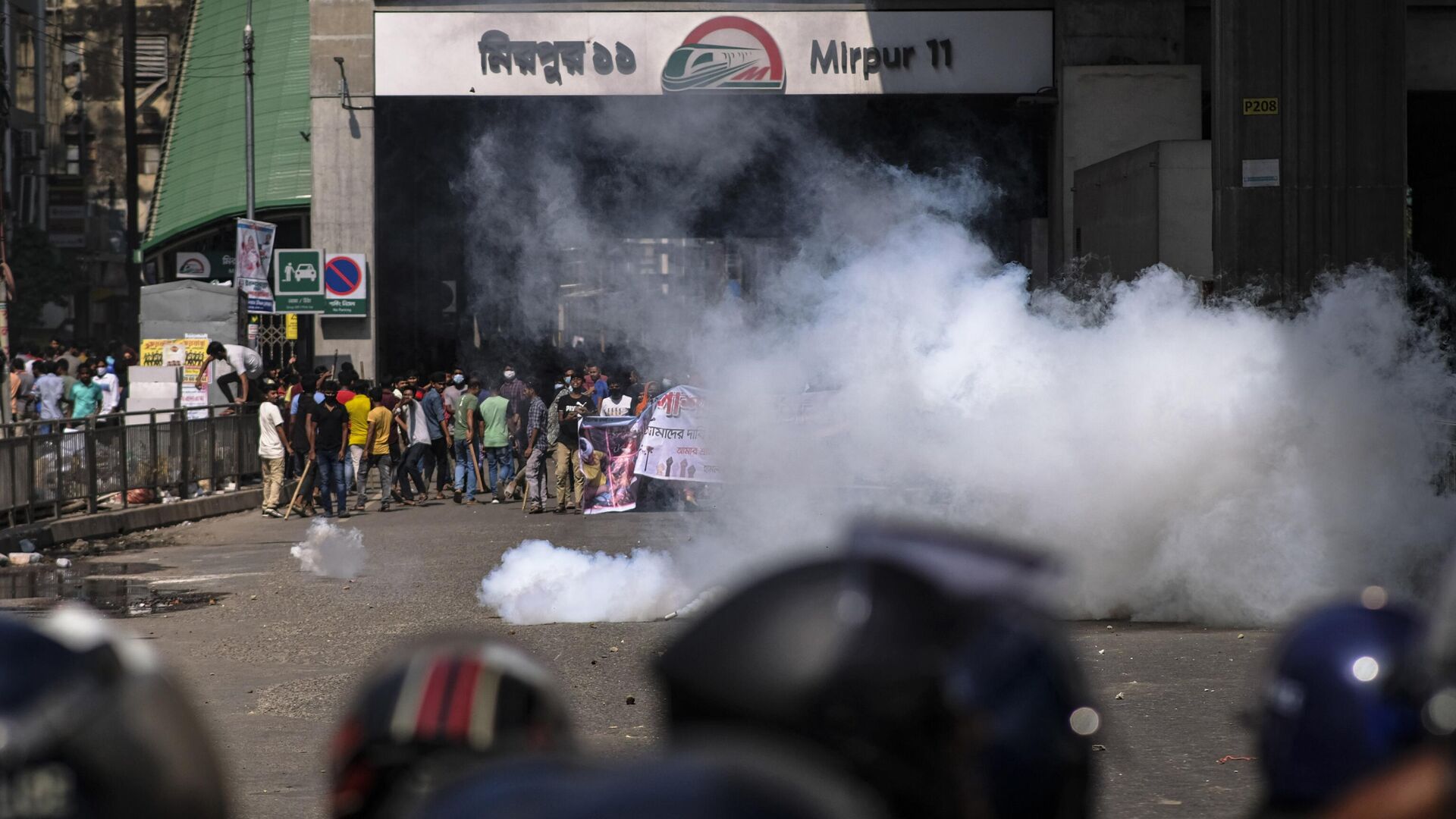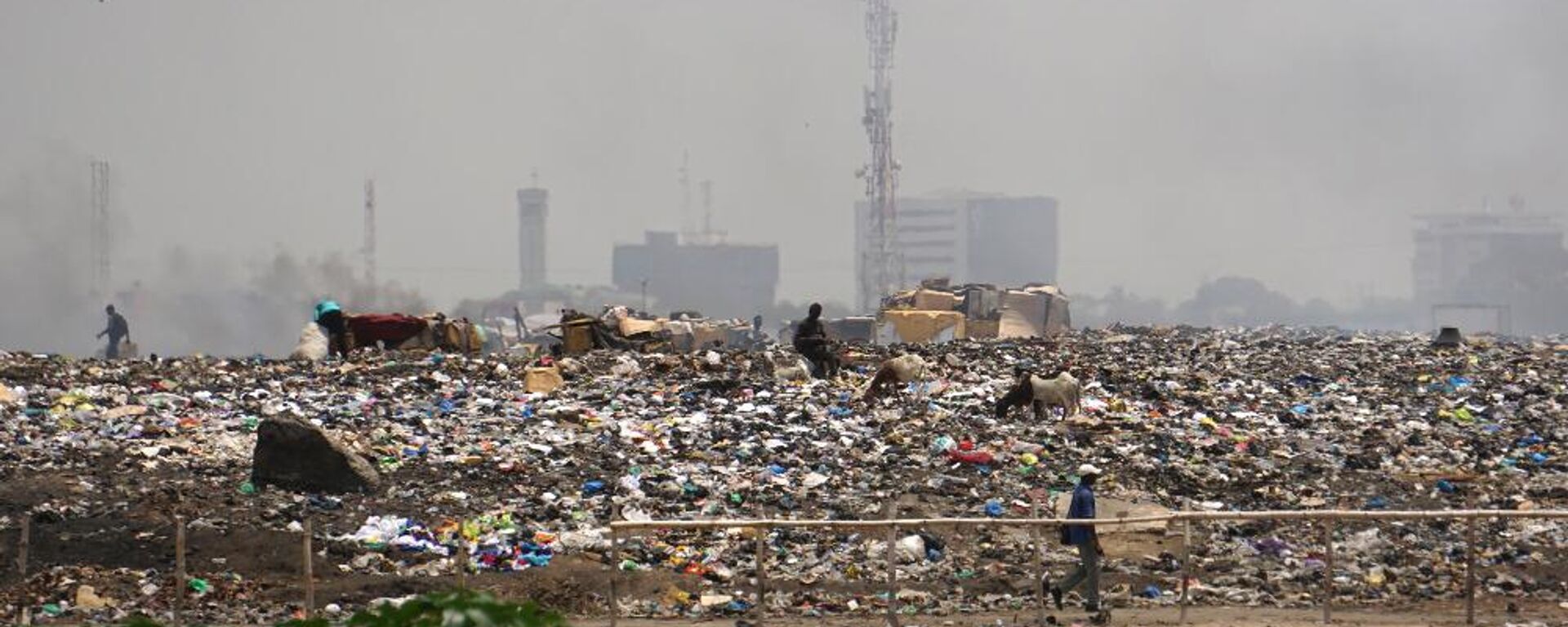Underpaid Garment Workers in Bangladesh Fighting for Basic Living Wage

© AP Photo / Mahmud Hossain Opu
Subscribe
MOSCOW (Sputnik), Tommy Yang - In light of the tragic death of several protesters during the recent demonstrations by garment workers in Bangladesh, an activist from a local organization leading the protests explained to Sputnik why the vulnerable employees were ready to risk their lives to fight for a basic living wage.
Thousands of workers from the garment manufacturing industry in Bangladesh took to the streets in recent weeks, protesting the government's proposal to only raise the minimum wage from 8,000 Bangladesh taka ($72.5) to 12,500 taka per month.
A number of independent labor unions representing the interests of garment employees demanded that the authorities hike the minimum wage per month to at least 23,000-25,000 taka, which they believed was closer to a wage that would meet the workers' basic needs.
Can't Afford Poultry or Eggs
As the general secretary of the Bangladesh Garment Workers Solidarity, an organization dedicated to fight for the rights of garment workers, Babul Hossain has been actively coordinating with garment workers in different cities to support their efforts in demanding a decent living wage in recent weeks.
Hossain went to Gazipur, a city in central Bangladesh where violent clashes took place during the recent protests, on November 14 to visit the family members of the workers who had been tragically killed in the unrest.
"On the 14th of November, we sent our general secretary, Babul Hossain, who is also a leading activist in the wage movement, to Gazipur to meet with family members of some of the deceased and wounded workers during the protests. After meeting with one worker's family, he went to another place. That's when the police came out from a bus and arrested him. He has been charged in a case of vandalism and the burning of car, which is totally laughable. How they can make up such a drama," Taslima Akhter, who is the president of Bangladesh Garment Workers Solidarity, told Sputnik.
Akhter believed that the charges against her colleague were completely groundless and started trying to secure his release.
"We couldn't get any information about him for more than 20 hours. Finally, we got some information that he's still being held in jail. We tried to apply for bail. But it was rejected. We're planning to apply for another bail next week," Akhter said.
Veteran activists like Hossain and Akhter, who have both been working with the Bangladesh Garment Workers Solidarity for over 10 years, understood how difficult it was for garment workers in Bangladesh to survive amid skyrocketing inflation in the country.
"In the past two years, the price hike [in Bangladesh] has been so high that it was impossible even for the middle class to survive. In our country, poultry is very much known as government worker food. For ordinary workers, it was quite impossible to eat eggs regularly because the eggs have become so expensive. If any worker suffered from dengue or this type of fever, they couldn't even afford the treatment," Akhter said.
The activist explained why the 25,000 taka per month minimum wage her organization demanded for the workers was far from a luxury or outlandish request.
"We're demanding 25,000 taka, which is about $220. Based on our research and what was mentioned in the global living wage research, we found that a worker needs at least 25,000 taka per month only to survive. If they want to live like a human being, they need more than 40,000 taka per month," she said.
No Growth in Purchasing Power
As someone who first got involved in advocating rights for workers while she was still a student, Akhter, along with a number of her friends, decided to found their own organization, named the Bangladesh Garment Workers Solidarity, after graduating from the University of Dhaka in 2008.
Akhter's work received international recognition when she captured a heartbreaking moment featuring two workers who were killed during the devastating collapse of the Rana Plaza, which housed more than five garment factories, in 2013.
As an activist trying to document the peril of garment workers in Bangladesh, Akhter rushed to the scene as soon as she heard about the accident. She took a picture of a young couple buried under the rubble while still holding each other tightly.
The iconic photograph, which became known as the "Final Embrace," was selected among Time magazine's Top 10 Photos of 2013.
Although the tragic accident at the Rana Plaza in 2013 led to reforms in the garment industry in Bangladesh, and working conditions for vulnerable employees improved in the following years, the growth of garment workers' salaries has always been lagging behind price increases.
"From 2010 to 2013, workers made about 3,000 taka per month. From 2013 to 2018, they made about 5,300 taka per month. And from 2018 to 2023, it was 8,000 taka per month. After the Rana Plaza accident in 2013, the infrastructure of the garment industry improved and the owners became aware of the safety of the factory buildings. But we cannot say the workers are getting more wage than before. If you count the salary, it did increase. But their buying power, how much things they could afford, did not grow," Akhter said.
The activist also told Sputnik that the share of female workers in the garment industry in Bangladesh had fallen from 80% to 60% in recent years because of increased automation in the sector and growing social pressure on women to dedicate more time to work in the household and taking care of their children.
International Responsibility
Despite the difficulties, the garment industry in Bangladesh has started to flourish in recent years, as a large number of international clothing brands, including Levi's, Zara and H&M, have decided to move their manufacturing to the south Asian country due to rising tensions between the United States and China.
In response to the recent protests in Bangladesh, 18 global grands, including Levi's, H&M, Gap and Puma, have reportedly jointly issued an open letter to the south Asian country's prime minister, urging peaceful negotiations and advocating for a minimum wage that could cover the workers' basic needs.
However, Akhter argued that the global brands should take more responsibility to make sure that the garment workers in Bangladesh are paid fairly.
"I think the international brands not only need to put more pressure on the Bangladesh government, but also need to take more pressure on themselves. They're the ones who are taking the lion's part of the profits. We should put more pressure on them. If they're willing to pay more [for the products], maybe we can bargain more with local [factory] owners [about the workers' salaries]. If we're only talking about the local [factory] owners and local governments, we're ignoring the responsibility of the international brands," she said.
The typical retail price of a pair of Levi's signature 501 jeans is around $80, which is more than the current minimum wage of 8,000 taka ($72.5) per month for garment workers in Bangladesh. The same pair of jeans would cost more than one third of a garment worker's monthly salary in Bangladesh, even if the local authorities agree to the labor union's demand of 25,000 taka ($220) per month.


